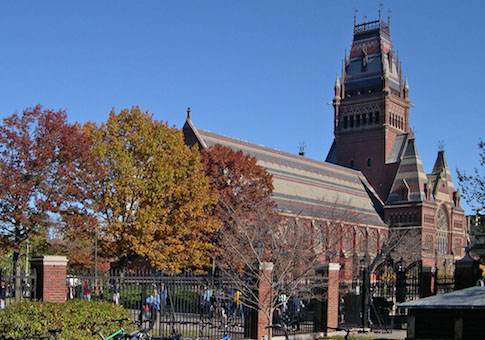Harvard University will bar students who join unrecognized single-gender social organizations from holding official leadership positions in student organizations and athletic teams.
The move, which will apply to students who matriculate at the university in the fall of 2017 and after, was announced by Harvard President Drew Faust in a message to the university community on Friday. It will affect the all-male and all-female final clubs at the university, as well as fraternities and sororities.
The punishment for students who join unrecognized single-sex groups was recommended by Rakesh Khurana, Harvard’s undergraduate dean, in a letter to Faust included in her message to community members. Khurana, who has for months been pushing the final clubs to go coed, wrote that the recommendations were meant to address "gender discrimination" at the university.
"The discriminatory membership policies of these organizations have led to the perpetuation of spaces that are rife with power imbalances," Khurana wrote. "The most entrenched of these spaces send an unambiguous message that they are the exclusive preserves of men. In their recruitment practices and through their extensive resources and access to networks of power, these organizations propagate exclusionary values that undermine those of the larger Harvard College community."
According to Khurana’s recommendations, students who become members of unrecognized single-sex organizations in the fall of 2017 or after "will not be eligible to hold leadership positions in recognized student organizations or athletic teams." They also will not be able to receive endorsement letters from the dean for fellowships requiring such endorsements.
"Procedures for implementing these new policies will be developed by an advisory group comprised of faculty, students, and administrators at the College," Khurana wrote.
Meanwhile, Harvard will continue to "work with" the single-sex groups to transition to co-ed membership, the letter stated. Khurana has for months been meeting privately with representatives of the all-male clubs to compel them to accept women, saying that "nothing is off the table" to push the clubs toward coed membership.
Two clubs have caved to pressure from the administration while others have resisted. Representatives of the clubs have accused the administration of coercion and threatening freedom of association.
In the letter, Khurana insisted that the new policies "will not prevent undergraduates from choosing their own paths while at Harvard."
"They are not designed to regulate the internal affairs of the unrecognized social organizations; the organizations retain the authority to set their membership criteria, even as the College will continue to urge them to adopt inclusive and non-discriminatory policies," he wrote.
Harvard’s effort to compel the all-male final clubs to assume coed membership has attracted national attention, some of it critical. Earlier this year, a task force convened to assess sexual assault at Harvard blamed the all-male clubs for perpetuating a "harmful sexual culture" and recommended that students be barred altogether from joining the groups.
The task force’s assessment relied on statistics produced by a survey of sexual misconduct at Harvard that task force members argued showed that female students who engage socially with the final clubs are more likely to experience sexual assault. However, an independent assessment recently commissioned by one of the all-male clubs found that the task force’s conclusions were unsubstantiated by the data.
The letters from Faust and Khurana regarding the new rules announced Friday make little mention of sexual assault and instead focus chiefly on the notion of inclusion at the university.
"A truly inclusive community requires that students have the opportunity to participate in the life of the campus free from exclusion on arbitrary grounds," Faust wrote in a letter accepting Khurana’s recommendations. "Although the fraternities, sororities, and final clubs are not formally recognized by the College, they play an unmistakable and growing role in student life, in many cases enacting forms of privilege and exclusion at odds with our deepest values."
The issue of sexual misconduct, she wrote, is related to the issues of inclusion and gender attitudes.
